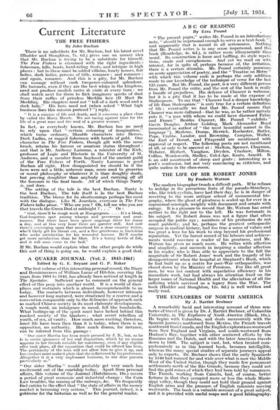Current Literature THE FREE FISHERS
By John Buchan There is no substitute for Mr. Buchan, but his latest novel (Hodder and Stoughton, 7s. 6d.) gives one an uneasy idea
that Mr. Buchan is trying to be a substitute for himself. The Free Fishers is crammed with the right ingredients : fishermen, hills, boats, hard-riding Scots, and intrigue in high aces : but to these must be added villains, lonely houses, fair ladies, dark ladies, persons of title, romance : and romance : and again, romance. And this is a pity, for Mr. Buchan can manage without such twopence-coloured splendour. His baronets, even if they are the best whips in the kingdom, need not produce modish cartes de visite at every turn : we shall watch next for them to flick imaginary specks of dust from their ruffles of priceless Mechlin lace (It Must Be Mechlin). His chapters need not " tell of a dark wood and a dark lady." His hero need not (when asked " What high business does this mission portend ? ") reply, " It is a mission of life and death, and it concerns a place close by called the Merry Mouth. We are racing against time for the life of a great man and the soul of a greater woman."
In fact, as everybody knows, Mr. Buchan has no need to rely upon that certain colouring of imagination," which turns ordinary, likeable characters into Heroes, Dark Ladies, or rugged fishermen with hearts of gold. One. character in The Free Fishers, though gilt with the same brush, retains his human or amateur status throughout : and that is Mr. Anthony Lammas, a minister of the Kirk, professor of Logic and Rhetoric in the University of St.. Andrews, and a member from boyhood of the ancient guild of the Free Fishers of Forth. Nanty Lammas is good Buchan all right. How disappointed we should be if the hero were not a little, unheroic man, more used to groceries or moral philosophy or whatever it is than doughty deeds, but proving doughtier than anybody and carrying off all the honours in the final tussle. All of which things Nanty is, and does.
The setting of the tale is the best Buchan. Nanty is the best Buchan. The tale itself is in the best Buchan tradition. The blame for its shortcomings perhaps lies most with the dialogue. Like M. Jourdain, everyone in The Free Fishers talks prose. " Who are you ? Oh, tell me who you are that travels the Green Dod at midnight ? . . ." Or : " God, there'll be rough work at Hungrygrain.. . . It's a bleak, God-forgotten spot among whaups and peesweeps and peat- mosses. But there have been queer ongoings there for many a day, and at this very hour there are queerer still. And now there's converging upon that moorland bit a dour country writer, who'll likely get his throat cut, and a fine gentleman in buckskins who seeks satisfaction for his wounded honour. He'll maybe get more satisfaction than he likes. It's a bonny kettle of fish, and it will soon come to the boil."
If Mr. Buchan would explain what the other people do while this sort of thing is going on, he would explain a good deal.






































 Previous page
Previous page